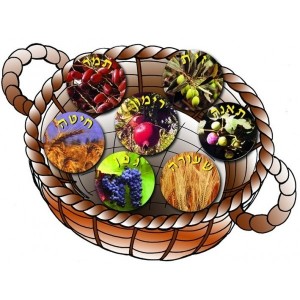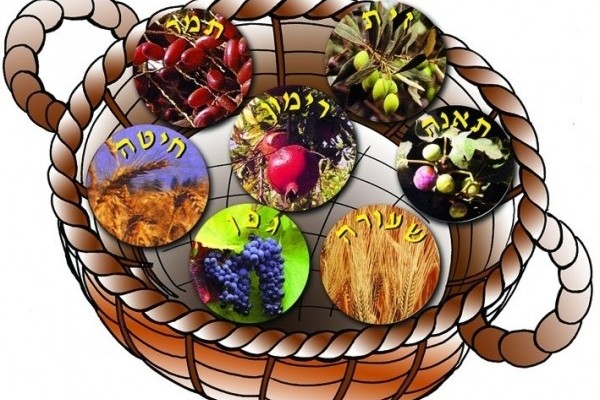“You shall bring the First-Fruits of your Land to the House of Hashem your G-d…” (Shemot 23,19)
 One of the names of the Holiday of Shavuot, is “Chag HaBikkurim,” “The Holiday of the First Fruits.” This refers to the “mitzvah,” or Torah-command, to Jewish farmers to bring to the Temple their first fruits, from the seven species with which “Eretz Yisrael” is blessed: wheat, barley, grapes, figs, pomegranates, olives and dates. In addition to bringing the First Fruits, the farmer is required to recite a declaration of gratitude to Hashem for bestowing His blessings upon Eretz Yisrael.
One of the names of the Holiday of Shavuot, is “Chag HaBikkurim,” “The Holiday of the First Fruits.” This refers to the “mitzvah,” or Torah-command, to Jewish farmers to bring to the Temple their first fruits, from the seven species with which “Eretz Yisrael” is blessed: wheat, barley, grapes, figs, pomegranates, olives and dates. In addition to bringing the First Fruits, the farmer is required to recite a declaration of gratitude to Hashem for bestowing His blessings upon Eretz Yisrael.
- Biblical Source
- Description of the Procedure
Biblical Source
In addition to the partial verse cited above, there is another section of the Torah, in Devarim 26: 1-11, which is devoted to this subject:
“And it shall be, when you enter the Land which the L-rd your G-d is giving you for an inheritance, and you possess it and begin to set up permanent residence in it. Then you shall take all the fruit of the ground, which you shall bring from your land, which Hashem your G-d is giving you; you shall put it into a basket, and you shall go to the place which Hashem your G-d will choose as a residence for His Divine Name.”
“And you shall come to the priest who will be serving at that time and you shall say to him, ‘I have declared today before Hashem your G-d that I have come to the Land which He swore to our fathers to give to us.’ “
“And the priest will take the basket from your hand and shall place it before the altar of Hashem your G-d. And you shall respond and declare, before Hashem your G-d, ‘A wandering Aramean was my father, and he went down to Egypt and set up temporary residence with but a few souls, and he became a great nation, mighty and numerous.’ “
“And the Egyptians dealt harshly with us and they tortured us, and they made us do hard labor. And we cried out to Hashem, the G-d of our fathers, and Hashem heard our voices, and He realized our suffering, and our great trouble, and our oppression.”
“And Hashem took us out of Egypt with a strong hand, and with an outstretched arm and with great Awesomeness, and with signs and with wonders. And He brought us to this place, and He gave us this Land, a Land flowing with milk and date-honey.”
“And now I have brought the first of the fruits of the Land which You have given me, O G-d.”
“And you should place it before Hashem your G-d, and you shall prostrate yourself before Hashem, your G-d.”
Description of the Procedure
A brief description is found in the following extract from that source:
Chapter 3; Mishnah 3
“Those who came from near to Yerushalayim would bring figs and grapes (because they would not be spoiled on a short journey); those who came from far from Yerushalayim would bring dried figs and raisins.”
“An ox went before them with its horns overlaid with gold, and a crown of olive leaves was upon its head. The flute was played before them until they approached Yerushalayim. When they came close to Yerushalayim, they sent messengers before them, and they would decorate their First-Fruits.”
“The governors, the chiefs and the treasurers went out to meet them. According to the rank of the arrivals, was the rank of those who came out to greet them. And all the craftsmen of Yerushalayim would stand before them and inquire concerning their welfare, ‘Our brothers, from Place So-and-So, welcome!’ “
Chapter 3; Mishnah 4:
“The flute was played before them until they reached the Temple Mount. Once they reached the Temple Mount, even Agrippas the King would carry the basket on his shoulder and go in as far as the Azarah. Once they reached the Azarah, the Leviim would sing, ‘I will praise You, O G-d, for You have raised me up, and You have not allowed my enemies to rejoice over me!’ “

